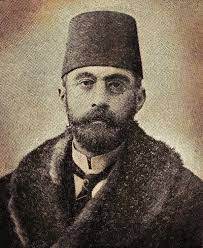Mevlanzade Rifat Bey

Mevlanzade Rifat Bey (1869 in Constantinople – 1930 in Aleppo), was an Ottoman Kurdish journalist and poet.
Early life and family
[edit]Mevlanzade's grandfather was called Mehmed Bey. he was one of the notable personages of Süleymaniye and descended from Khâlid-i Shahrazuri.[1] Mevlanzade's father was Abdurrahman Nacim Efendi who was born in the Şehrizor district of Süleymaniye, Abdurrahman entered into the Ottoman civil service and became head of Diyarbakır Province Court and later head of the Beirut Court of Appeals, he was also a poet and died in Harpoot in 1895.[2] Mevlanzade's wife was Nuriye Ulviye Mevlan Civelek.[3]
Journalism and exile
[edit]Mevlanzade Rifat Bey was one of the most notable and widely read journalists of the Ottoman Empire. He was the owner and editor in chief of Serbestî and friend of the slain journalist Hasan Fehmi. He spent most of his life in exile including France, Yemen, Egypt, Syria and Greece.[4] An opponent of Abdul Hamid II, he was initially a member of the Young Turk central committee but later one of its most ardent critics[5] and later a member of the Freedom and Accord Party.[6] He was among the few public figures in the Ottoman state who condemned CUP policies against the Armenians, noting that the deportations carried out were systematically planned by the Young Turk as a means to solving the Armenian question by genocide.
Mevlanzade also opposed Mustafa Kemal Atatürk and was named as one of the 150 personae non gratae of Turkey.
He was an opponent in three different periods, firstly against Abdul Hamid II, secondly against Committee of Union and Progress and thirdly against Mustafa Kemal Atatürk.
Kurdish nationalism
[edit]He extensively lobbied the British, French and Greeks for support in establishing an independent Kurdistan. He met with Dimitrios Gounaris to this end. Mevlanzade was also a prominent member of the Society for the Elevation of Kurdistan, and defended the Fourteen Points by Woodrow Wilson, according to which the rights of all nationalities within the Ottoman Empire are to be considered.[7]
Mevlanzade Rifat also acted as the liaison between the Kurds in Khoybun and the Armenians. He was close friend of Celadet Bedir Khan and Süreyya Bedir Khan whose articles he published.
He was the official spokesman of the Society for the Elevation of Kurdistan president Abdulkadir Ubeydullah.
References
[edit]- ^ Henning, Barbara (2018). Narratives of the History of the Ottoman-Kurdish Bedirhani Family in Imperial and Post-Imperial Contexts: Continuities and Changes. University of Bamberg Press. p. 394. ISBN 978-3863095512.
- ^ "Faik Bulut | Bir Kürt diplomatı olarak Mevlanzade Rıfat (2)". Independent Türkçe (in Turkish). 2020-06-28. Retrieved 2020-08-12.
- ^ "Faik Bulut | İflah olmaz bir Osmanlı aydını: Gazeteci ve siyasetçi yanıyla Kürt Mevlanzade Rıfat (1)". Independent Türkçe (in Turkish). 2020-06-21. Retrieved 2020-08-13.
- ^ Ozoglu, Hakan (2011). From Caliphate to Secular State: Power Struggle in the Early Turkish Republic: Power Struggle in the Early Turkish Republic. ABC-CLIO. p. 68. ISBN 978-0313379574.
- ^ Chalabian, Antranig (1988). General Andranik and the Armenian Revolutionary Movement. University of Michigan. p. 226.
- ^ Yelbasi, Caner (2019). The Circassians of Turkey: War, Violence and Nationalism from the Ottomans to Atatürk. Bloomsbury Publishing. p. 52. ISBN 978-1838600181.
- ^ Özoğlu, Hakan (2004-02-12). Kurdish Notables and the Ottoman State: Evolving Identities, Competing Loyalties, and Shifting Boundaries. SUNY Press. ISBN 978-0-7914-5993-5.
